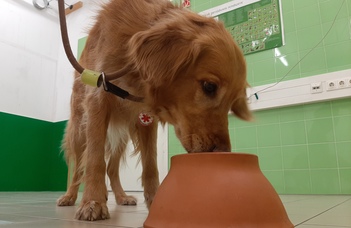MTA-ELTE NAP Canine Brain Research Group

PIs: Dr. Attila Andics and Prof. Enikő Kubinyi
Funding: Hungarian Academy of Sciences National Brain Program (NAP3.0) (2022-2026)
Contact: eniko.kubinyi@ttk.elte.hu
The Canine Brain Research Group is conducting research on the olfaction of dogs, humans and other mammals at the Department of Ethology at ELTE. Smell is the oldest yet least studied sensory ability in vertebrates. Despite the relatively small size of the human olfactory bulb, many humans have excellent olfaction, and smell also plays an important role in interpersonal communication and emotions. However, science has neglected this area, underestimating the impact of olfactory disorders on quality of life.
The COVID-19 pandemic has renewed interest in smell, as the SARS-CoV-2 infection responsible for the epidemic causes a loss or distortion of smell and taste in a significant percentage of cases. Our research aims to investigate (1) the olfactory sensitivity and processing neural structures of three mammalian species, namely humans, dogs, and mice; (2) the olfactory ability and performance of trained and untrained dogs; (3) the individual variability of olfactory performance as a function of head shape, genetics, education, personality traits, age, and gut or nasal microbiome; and (4) the effect of COVID-19 on the training of search dogs and olfactory nerve processing in humans.
Group members
Principal investigators:
- Dr. Andics Attila
- Prof. Eniko Kubinyi
Senior research fellow
- Dr. Márta Gácsi
Postdoctors:
- Dr. Attila Salamon
- Dr. László Róbert Zsiros
PhD
- Asami Nakaimuki
- Franciska Furik
Publications
- Salamon, A., Baranya, E., Zsiros, L.R., Miklósi, Á., Csepregi, M., Kubinyi, E., Andics, A. and Gácsi, M., 2024. Success in the Natural Detection Task is influenced by only a few factors generally believed to affect dogs’ olfactory performance. Scientific Reports, 14(1), p.12351. https://www.nature.com/articles/s41598-024-62957-5

